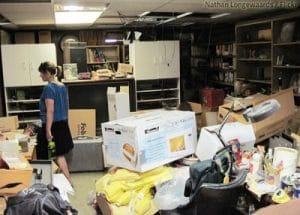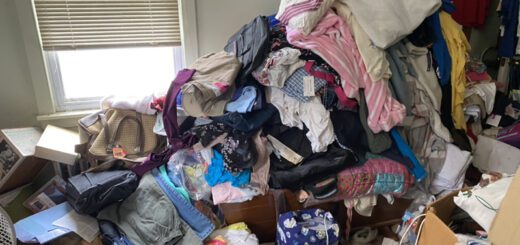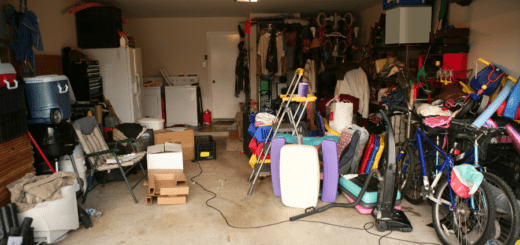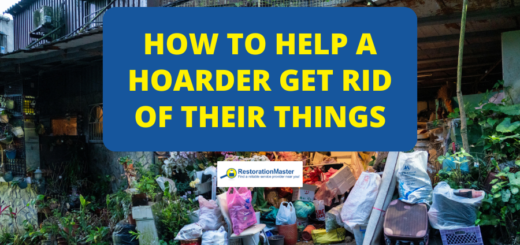Lesser Known Positive Consequences of Hoarding Cleanup
After a lengthy uphill battle, friends or family members of people with a hoarding disorder sometimes effectively convince their loved one to clean up and seek treatment. Persuading someone who has collected scraps of decayed food, random receipts dating back 20 years, and boxes upon boxes of tools is a difficult challenge. When you have won, a mountainous burden is lifted—emotionally and literally.

Cleaning up a hoarder’s home results in increased health benefits and reduced risks of injury for the property owner.
A hoarder’s home is replete with noxious fumes, is crawling with harmful bacteria and life-threatening pathogensPathogens are microorganisms such as bacteria, viruses, or f... More, and produces unbearable odors that may even waft into the neighbor’s property, causing community uproar. Healthwise, an individual suffering from a hoarding disorder is in the center of chaos. The hoarder is likely to experience an array of ailments, from respiratory conditions that stem from breathing polluted air to allergies that result from rampant moldMold is a type of fungus that grows in damp or humid conditi... More infestations to physical injury when garbage piled sky high to the ceiling eventually tumbles onto the unwitting homeowner.
A clean house, in stark contrast, is, simply, habitable. The health of the homeowner is rarely in jeopardy when clean air circulates and environmental bacteria are regularly scrubbed away via weekly chores. Clearly, cleaning up a hoarder’s home results in increased health benefits and reduced risks of injury for the property owner. Aside from the obvious advantages of hoarding cleanup, a handful of lesser known rewards make a welcome appearance:
Improve Relationships
Living with a hoarding disease can be lonely. Being ostracized for stockpiling massive amounts of harmful junk is rarely a good experience. When a hoarder cooperates with a cleanup, relationships are gradually restored.
Compassionate neighbors, who were once put off by the toxic fumes emanating from the hoarder’s home next door, are now far less likely to call authorities and more inclined to visit for an afternoon of bridge. Friends, too, suddenly reappear. The home gets a break from being a warzone, and an ambush by falling castoffs is no longer a threat.
Familial relationships also make a comeback. When a hoarder accepts help for his or her disorder, loved ones are often the first to step in with unbridled support.
Plus, an individual with a hoarding disease who has children is more likely to keep the kids. When a living environment is safe, child services are less likely to remove the children from the home.
Sleep Better
People with hoarding issues also tend to experience disrupted sleep patterns. Excessively cluttered bedrooms and beds made uncomfortable with miscellaneous clutter prevent the hoarder from experiencing quality sleep. Tidy up, and the person who hoards will find themselves sleeping more restfully.
Improve Focus

When a hoarder cooperates with a cleanup, relationships are gradually restored.
A decluttered environment encourages enhanced focus. Princeton University Neuroscience Institute researchers found that a cluttered environment restricts a person’s ability to achieve full concentration. Hoarders will discover that their ability to channel their energies into a meaningful project is easier inside a clean home.
Keep the Home
Hoarders who accept help are less likely to be evicted from their home. Many local ordinances require that homes meet certain community standards when it comes to physical appearance and safety. The likely possibility of heavy fines and even jail time are also avoided once a hoarder elects to tidy up.
Keep the Pets
Animal hoarding, where people house dozens of cats, dogs or birds within their home, is met with opposition by law enforcement and neighbors. Hoarders frequently accumulate animal waste, even storing them in glass jars or permitting pet urine to seep into the floorboards, which leads to foul fumes unleashed into the atmosphere. When an animal hoarder declutters, the individual may be allowed to keep one or two animals.
Discover Valuables
Underneath the enormous piles of reeking garbage may be a few glittering gems. When a hoarding cleanup ensues, valuable mementos may be uncovered. Family heirlooms lost under piles of rubbish could possibly be discovered, giving the person with the hoarding disorder newfound purpose in continuing the cleanup efforts.
With hoarding disorders being a psychiatric illness, the anxiety felt with throwing out possessions during the cleanup process spikes. Stumbling across cherished mementos reinvigorates the hoarder with pleasing emotions, making the cleanup far more bearable.
People living with hoarding disorders are more likely to experience financial issues. Compulsively purchasing unnecessary random goods leads to significant monetary setbacks. During a cleanup, however, functional items can be cleaned and sold, giving the hoarder an improved financial state.
Experience Psychological Welfare
The constant angst and depression that plague individuals who hoard are immensely reduced when treatment is underway, the hoarding tendencies are reduced, and cleanup begins. When a hoarder accepts therapy, the individual’s negative emotions, like the fear, anxiety and depression that may have contributed to the hoarding illness, are professionally addressed. Receiving therapeutic treatment for hoarding liberates the hoarder from the unpleasant emotions.
Accepting assistance in cleaning up a hoarded home is a breakthrough for people with a hoarding disorder. A hoarder’s willingness to make their home livable indicates an acknowledgement of their disorder and is an important step toward recovery.
When a friend or loved one with a hoarding disorder is ready to see the benefits of cleaning up, a professional restorationRestoration is the process of returning a property to its pr... More service provider is a phone call away. Skilled technicians from professional hoarding cleanup companies offer comprehensive hoarding cleanup services to restore the home. Specialists arrive onsite and begin with decontamination of the space to create a safe living environment. Powerful deodorizers are utilized during the cleanup process to remove offensive odors. Biohazard materialsBiohazard materials are substances that pose a risk to human... More are properly disposed, with all waste disposal following local regulations.
While hoarding cleanup requires steady effort, the professionals also recognize the need for sensitivity when communicating with the person living with the hoarding disorder. Technicians are trained to approach the affected individual with compassion. Prior to items being discarded, they will consult the hoarder, ensuring the individual is fully involved in the cleanup of their possessions.












